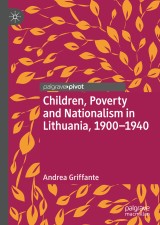Details

Children, Poverty and Nationalism in Lithuania, 1900-1940
|
58,84 € |
|
| Verlag: | Palgrave Pivot |
| Format: | |
| Veröffentl.: | 05.11.2019 |
| ISBN/EAN: | 9783030308704 |
| Sprache: | englisch |
Dieses eBook enthält ein Wasserzeichen.
Beschreibungen
This book discusses the emergence of care for orphaned, abandoned and poor children in Lithuania from the early twentieth century to the beginning of the Second World War. In particular, it focuses on how such practices were influenced by nationalist and political discourses, and how orphanages became privileged institutions for nation building. Emerging during the humanitarian crisis following the First World War, the Lithuanian orphaned and destitute children’s assistance network had an eminently ethno-national character, and existed in parallel with, and was challenged by, Polish poor child assistance institutions. By analysing such care for children, this book explores concepts such as the nation state and citizenship, as well as the connections between poverty, childhood and nationalism.
1. The Future of the Nation: The Emergence of Poor Children as a Problem.- 2. The Great War over Children, 1914–1918.- 3. Rehabilitating Children: Lithuania and International Humanitarian Aid, 1918-1923.- 4. The New Interwar Order: Children, Rehabilitation and Discipline, 1923-1940.- 5. Final Remarks.
<b>Andrea Griffante</b> is a Senior Research Fellow at the Lithuanian Institute of History, Vilnius. After graduating at the University of Trieste, he received his PhD in history from the University of Klaipėda, Lithuania.
This book discusses the emergence of orphaned, abandoned and poor child care in Lithuania from the early 20th century to the beginning of World War II. In particular, it focuses on how poor child care practices were influenced by the nationalist and political discourse, and how orphanages became privileged institutions for nation building. Emerging during World War I and the early postwar humanitarian crisis, the Lithuanian orphaned and destitute children’s assistance network remained managed mainly by private actors. The field remained highly competitive. Until the early 1920s, concurrence had an eminently ethno-national character and the Lithuanian network was challenged by stronger Polish poor child assistance institutions. Nation-building goals did not prevent the emergence of political concurrence within separate ethno-national assistance networks. Even if political concurrence did not stop cooperation within the ethnic community, it did confirm the multiple character of nationalmobilization and consolidation processes in which otherness is by no means only ethnic in content.
Discusses the emergence of care for orphaned, abandoned and poor children in Lithuania from the early twentieth century to the beginning of the Second World War Focuses on how such practices were influenced by competing nationalist and political discourses Explores how orphanages became privileged institutions for nation building
Diese Produkte könnten Sie auch interessieren:

The Last Samurai - Japanische Geschichtsdarstellung im populären Kinofilm

von: Daniel Scherrer

34,99 €















